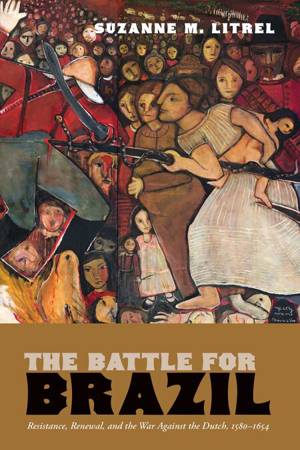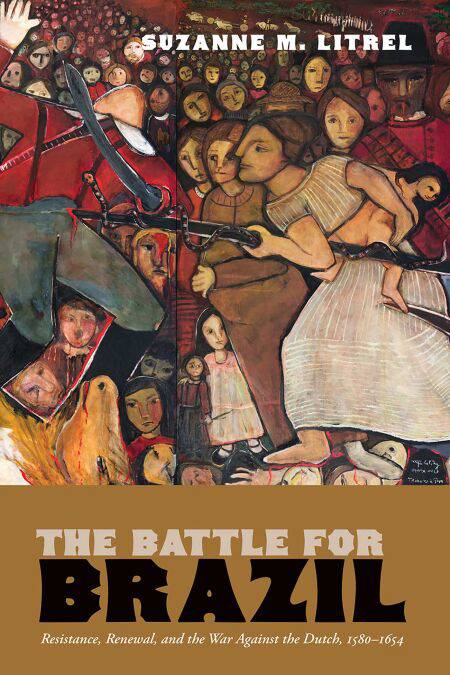
- Retrait gratuit dans votre magasin Club
- 7.000.000 titres dans notre catalogue
- Payer en toute sécurité
- Toujours un magasin près de chez vous
- Retrait gratuit dans votre magasin Club
- 7.000.0000 titres dans notre catalogue
- Payer en toute sécurité
- Toujours un magasin près de chez vous
The Battle for Brazil EBOOK
Resistance, Renewal, and the War Against the Dutch, 1580–1654
Suzanne M. Litrel
29,07 €
+ 29 points
Description
This book examines a crucial turning point in the colonial history of Brazil and especially the enduring consequences of local and trans-Atlantic resistance to Dutch colonialism.
From a desert death march in North Africa to the war-torn beaches of Bahia, The Battle for Brazil: Resistance, Renewal, and the War Against the Dutch, 1580–1654 integrates Portuguese prophecy, myth, and tradition with on-the-ground action. A remarkable moment in an enduring global contest, the Dutch challenge for Brazil was sparked by the 1580 Spanish claim of the Portuguese throne. The Netherlanders, already locked in battle against Habsburg Spain, turned on their old trading partners, and Portuguese trading posts fell to the Dutch East India Company’s relentless assaults. Then the Dutch turned west—to Brazil. In 1624, Portuguese soldiers, priests, and their indigenous allies pinned invading Dutch West India Company troops to the town of Salvador, Bahia. The following year, a joint Luso-Spanish armada helped oust the Dutch—a short-lived interlude in the battle for Brazil (1630–1654). As town by town fell to the enemy, and as the West India Company expanded control over the Brazilian northeast, it seemed that the contested colony would go Dutch.
By the end of 1640, the restoration of an independent Portugal ended sixty years of Spanish rule, but this did not end the kingdom’s trials. With Dom João IV of Braganza on the throne, the kingdom of Portugal now faced a two-front challenge—at home, from Spain, and abroad, from the Dutch. Within five years, lackluster support from Lisbon prompted a new phase of local resistance against the Dutch in Brazil.
This defiance manifested in what would become known as the “Divine War of Liberation”—and with it, an emergent Luso-Brazilian identity. On the ground, cross-class and transatlantic alliance and coordination, formed in the first Dutch assault, only strengthened during the next nine years. The Battle for Brazil highlights the actions of once-marginalized men and women of European, African, Indigenous, and mixed descent who helped force final Dutch surrender by 1654. On both sides of the Atlantic, the battle for Brazil proved a spiritual venture and a reckoning, shaping a new world to come.
From a desert death march in North Africa to the war-torn beaches of Bahia, The Battle for Brazil: Resistance, Renewal, and the War Against the Dutch, 1580–1654 integrates Portuguese prophecy, myth, and tradition with on-the-ground action. A remarkable moment in an enduring global contest, the Dutch challenge for Brazil was sparked by the 1580 Spanish claim of the Portuguese throne. The Netherlanders, already locked in battle against Habsburg Spain, turned on their old trading partners, and Portuguese trading posts fell to the Dutch East India Company’s relentless assaults. Then the Dutch turned west—to Brazil. In 1624, Portuguese soldiers, priests, and their indigenous allies pinned invading Dutch West India Company troops to the town of Salvador, Bahia. The following year, a joint Luso-Spanish armada helped oust the Dutch—a short-lived interlude in the battle for Brazil (1630–1654). As town by town fell to the enemy, and as the West India Company expanded control over the Brazilian northeast, it seemed that the contested colony would go Dutch.
By the end of 1640, the restoration of an independent Portugal ended sixty years of Spanish rule, but this did not end the kingdom’s trials. With Dom João IV of Braganza on the throne, the kingdom of Portugal now faced a two-front challenge—at home, from Spain, and abroad, from the Dutch. Within five years, lackluster support from Lisbon prompted a new phase of local resistance against the Dutch in Brazil.
This defiance manifested in what would become known as the “Divine War of Liberation”—and with it, an emergent Luso-Brazilian identity. On the ground, cross-class and transatlantic alliance and coordination, formed in the first Dutch assault, only strengthened during the next nine years. The Battle for Brazil highlights the actions of once-marginalized men and women of European, African, Indigenous, and mixed descent who helped force final Dutch surrender by 1654. On both sides of the Atlantic, the battle for Brazil proved a spiritual venture and a reckoning, shaping a new world to come.
Spécifications
Parties prenantes
- Auteur(s) :
- Editeur:
Contenu
- Nombre de pages :
- 256
- Langue:
- Anglais
- Collection :
Caractéristiques
- EAN:
- 9780826369062
- Date de parution :
- 12-01-26
- Format:
- Ebook
- Protection digitale:
- Adobe DRM
- Format numérique:
- ePub

Les avis
Nous publions uniquement les avis qui respectent les conditions requises. Consultez nos conditions pour les avis.






